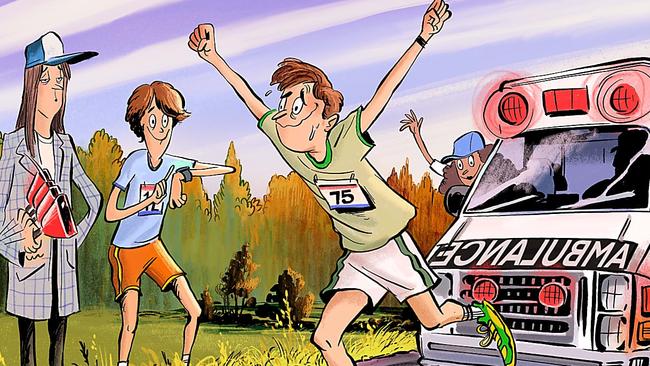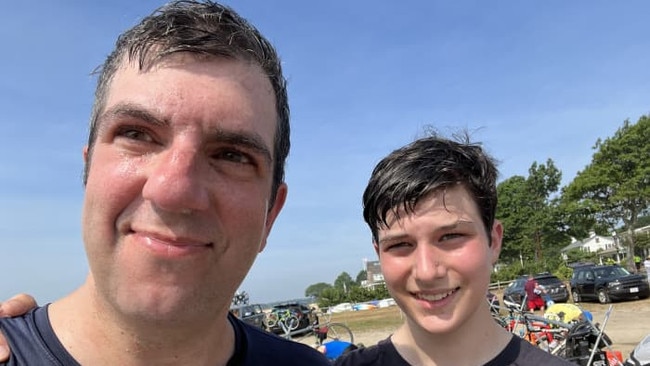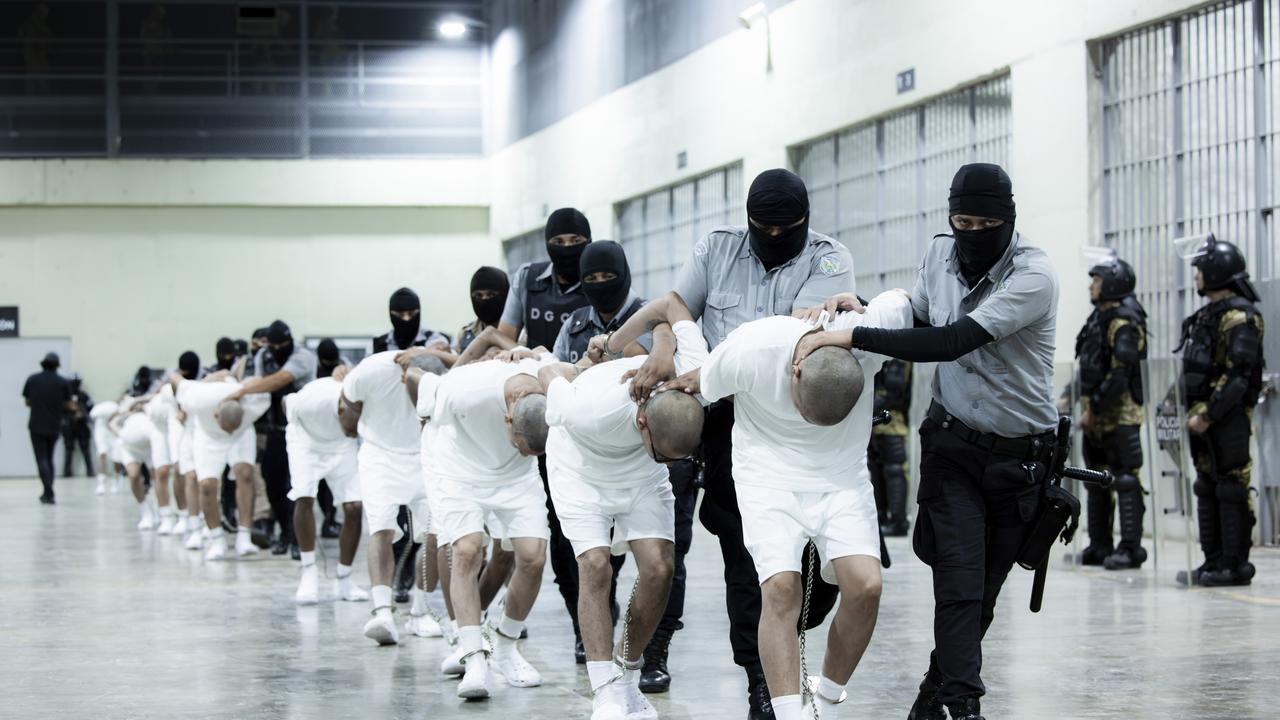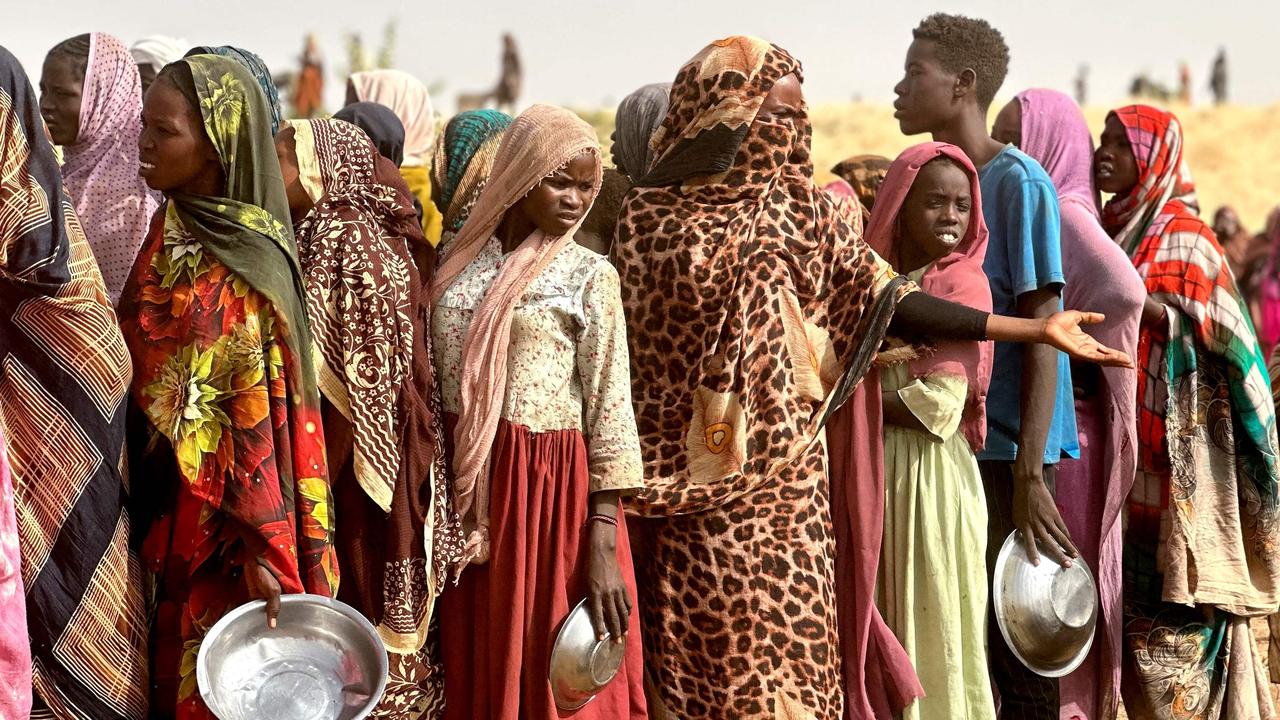What I learned from coming in last place in a triathlon
I didn’t want my 16-year-old son to see his dad as the ultimate loser. But maybe not giving up was a more important lesson.

When I signed up to do a triathlon a couple of summers ago, I had one goal. It wasn’t to win the race — or even to place in the top half of my over-50 age group. My goal was simple: not to finish in last place. Second to last? OK. Just so long as I was not the final person to cross that finish line. I wanted to avoid the shame and mockery of the booby prize. I didn’t need another participation trophy, like the one I got in fifth grade on the day I peed my pants during Newcomb and stayed in the corner hoping no one would notice. After all, I was doing the triathlon with my 16-year-old son, Zane. I didn’t want him to see his dad as the ultimate loser. I’m not much of an athlete.
Don’t panic, I told myself, there had to be a few in the crowd even less prepared than I was. Maybe there was someone recovering from a torn ACL.
I type emails while walking on my treadmill but find lung-burning aerobic exercise deeply unpleasant. A race of any sort was always going to be a stretch. But that summer my concerned wife urged me to get in shape, and my son came up with an alarmingly drastic proposal: Let’s do a triathlon together, Dad! Since it was my son’s idea, I felt I couldn’t say no. What kind of message would that send? So I searched online and found a triathlon a few weeks hence in Massachusetts, a four-hour drive from our New York apartment.

To be candid, the triathlon I found wasn’t a hard-core two-mile swim, 100-mile bike ride and 26-mile run. This race was shorter — much shorter. Euphemistically called “a sprint triathlon,” it was in fact the shortest race to technically qualify as a triathlon: a quarter-mile swim, 12-mile ride and three-mile run. “That’s not an Ironman,” a friend told me. “That’s barely a styrofoam man.” My son and I had four weeks to train. He was in decent shape from school sports teams. I did my best. I forced myself to run around the Central Park reservoir a few times and do some laps at the local Jewish Community Center. Zane and I drove up the night before the race. When we wheeled our bikes to the base camp, I looked around and felt queasy. So many sharply defined triceps and quads. So many moisture-wicking socks, buoyant wetsuits and tubes of body glide. So many packs of mango-chia high-calorie energy gels. These folks were prepared. Don’t panic, I told myself, there had to be a few in the crowd even less prepared than I was. Maybe there was someone recovering from a torn ACL. We lined up by the shore and splashed into the Atlantic bay two by two. The icy water made me gasp. Zane immediately pulled away with strong freestyle strokes. I resorted to the breaststroke after five minutes. Eventually I rounded the last buoy and made it back to land. I was in the bottom half of the pack but holding my own. I ran to my bike, strapped on my helmet and started pedalling along the hilly back-road course. Here’s what I heard for the next half-hour: “On your left! … On your left! … On your left!” These bikers may have tried to sound neutral, but I could hear the glee in their voice as they whizzed by. After 12 miles, I steered my bike through the sensors. I’d dropped lower in the pack, but there were several racers behind me. The running portion was my least favourite. No equipment to help — just me, my sneakers and the pavement. I huffed and grimaced as runners passed me, but I wasn’t in last place. When I glanced back, I saw a woman who looked to be in her 70s, huffing and grimacing as much as I was. I can take her, I told myself. Just keep the feet moving. Then, in the third and final mile, her sneaker-steps got louder and faster. She’d found a second wind. What the hell? Was it the chia-mango energy gel? I watched her pull away and disappear around a bend. There I was. Alone. Well, not totally alone.
I may not be a great runner, swimmer or cyclist, but I am a champion at changing the narrative. And that might be more useful than athletic prowess.
I passed the occasional spectator still lining the street, patiently ringing a cowbell and shouting with condescending kindness, “You got this!” I refused to walk, even though walking would probably have been faster than my foot-dragging facsimile of running. Worse, I was joined by a four-wheel symbol of shame: the official triathlon ambulance pottering 10 feet behind me in case I collapsed. Finally, I crossed the finish line. Yes, finally, 121st out of 121 racers. My son was there, recording my accomplishment with his iPhone. He hugged and congratulated me. But I was embarrassed and angry.
I reeled off an impressive number of excuses. The bike brake was rubbing against the wheel. My swim goggles kept filling up with water. There were people doing relays, meaning one person swam, another biked, another ran. Come on! That’s not a triathlon! Did Hercules finish one labour and then tell his cousin, “OK, now you go slay the Hydra?” I stewed and ruminated and fumed. But then, over the next five hours, the humiliation ebbed. Maybe it was the post race plastic cup of Champagne. Maybe it was my son saying he loved doing a triathlon with me, no matter what the outcome. Whatever the reason, by the time we arrived home that evening, my embarrassment had been replaced by a paradoxical pride. I had achieved something more impressive than finishing a triathlon. I had reframed my last-place finish as a victory. After all, I told myself, the real victory was that I didn’t give up. I finished the race! I’m not a loser. I’m a triathlete and a role model for my son! Persistence and resilience, that’s what I displayed. I showed Zane that not winning is OK as long as you try your hardest. And I wasn’t really racing against others. I was racing against myself. Plus, my son did great, placing somewhere in the middle of the pack. I love that he beat me. I’m always confused when I hear stories of dads threatened by their child’s talent. I’m happy to have my kids trounce me. Also, there is something glorious about last place. Think of the Tour de France, where the cyclist who places last gets a special Red Lantern award and is a symbol of grit. Here’s the thing: I may not be a great runner, swimmer or cyclist, but I am a champion at changing the narrative. And that might be more useful than athletic prowess.
A.J. Jacobs’s most recent book is “The Year of Living Constitutionally,” published by Crown. Appeared in the October 12, 2024, print edition as ‘What I Learned From Coming in Last Place in a Triathlon’.— WSJ




